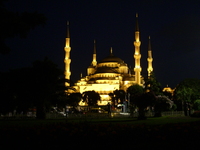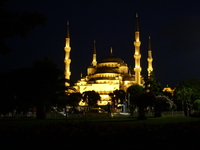
* Tuesday, April 21.
Wow. Across three days and meeting in total for 25 hours with seven meals, about 65 Muslim and Evangelical leaders met in Pasadena, Calif., to discuss a wide range of topics.
Don Wagner, a leader in this initiative and a professor at North Park University, at the end exclaimed, “The Holy Spirit has been present with us!.” True confessions, he’s right. Yes, Islam teaches about the Holy Spirit, not as a person, but as God’s active force. (Yeah, we disagree on that one too.)
In summary, here are my three take-aways from this event:
– The person of Jesus and our relationship with him must be central to discussions between Muslims and evangelicals.
– Evangelical advocacy for religious freedom worldwide is best positioned when it is clearly linked to the benefit of religious freedom for all faiths, not just for Christians.
– Religious labeling of all kinds is hazardous to our spiritual health.
* Friday, April 17, 10 pm, update
About 60 Muslim and Evangelical leaders and seminary students met for 12 hours of meetings, meals, and discussion on the Fuller Seminary campus today. (The session resumes tomorrow morning. See below for additional details.)
My head is spinning from the quality of the presentations and the passionate exchanges. So far, this has been a richly rewarding event.
Here are some of my initial impressions after interacting with these scholars, authors, editors, professors, students, and ministry leaders:
1. Muslims and Evangelicals who are committed to the work of dialogue spend a lot of time explaining to each other why extremists do what they do in the name of their own faith.
2. Islam, Christianity, and Judaism have been, are now, and will be in a deep encounter for generations to come. While there was little discussion of Jews and Judaism, the reality of this encounter was for me inescapable. Dialogue that does not lead to tri-a-logue will not survive the test of time.
3. Muslims and Evangelicals once and for all must settle, resolve, mutually understand, and respect their divergent doctrines of God. The end value of such a heroic effort of understanding must not be underestimated.
4. One scholar admitted to what he called “dialogue fatigue.” Actually, I see that as real progress. When Muslims and Evangelicals press beyond the far point of verbal exhaustion, isn’t that when we can breakthrough to some other new place? Listening to God requires our silence.
5. Evangelicals and Muslims do each other a disservice when they mutually shy away from airing their grievances openly due to quick pursuit of easy faith-based harmony.
6. There is true urgency to this pursuit of relationship and understanding between Muslims and Evangelicals. The consequences of growing tension between Islam and Christianity are growing greater. As I said to one participant, “Lives and souls hang in the balance.”
* Friday, 9 am
I’m on campus at Fuller Seminary in sunny & warm Pasadena, CA, for today and tomorrow as about 65 Muslim and Evangelical leaders from North America and the Middle East are discussing a wide range of mutual concerns. The World Islamic Call Society is sponsoring this session, the third one of its kind.
The title is, “A Common Word Between Us and You.”
Among the evangelicals here are: Donald Wagner, Leith Anderson, Gary Burge, Len Rogers, Colin Chapman, Dudley Woodbury, and Martin Accad.
Muslim leaders include: Mahmoud Ayoub, Assad Busool, Asma Afsaruddin, Muhammad Sammak, Jamal Badawi, Sayid Sayeed, Abed Ismail.
See below for five of the questions under discussion. I welcome your input since I will be a presenter on Saturday afternoon.
What additional questions would you want explored?
Email me, here. Or, add your question in the comments section below.
Some of the topics to be explored, in question format:
1. What is role and meaning of worship in the New Testament and the Qur’an?
2. What lessons are there for us in looking at the treatment of Christian minorities under Muslim rule and Muslim minorities under Christian rule?
3. What are the consequences, goals, and obstacles of dialog between Muslims and Evangelicals?
4. How should we approach the problem of terrorism and the plight of American Muslims and also the plight of Middle Eastern Christians?
5. How does the call for equality and justice influence the treatment of Muslims and Christians in the North American media, and also in the Muslim media?
(Photo: ‘Blue Mosque,’ Istanbul, Turkey.)









